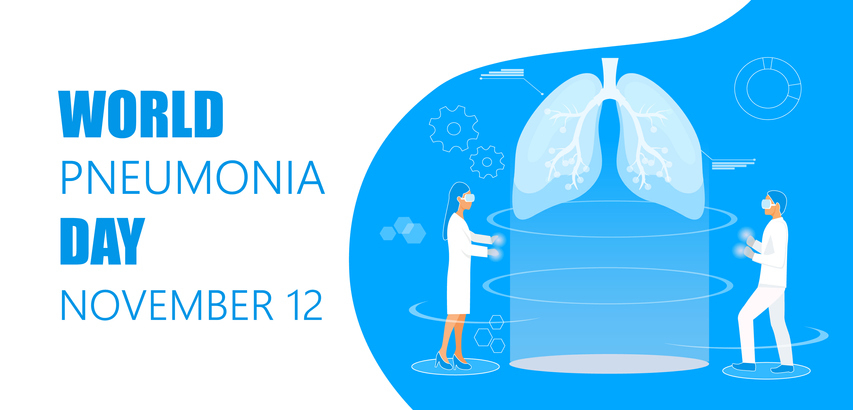Commitment + Clinical Leadership = Better Outcomes

4 Facts about Pneumonia
November 12th is World Pneumonia Day. This day is dedicated to fighting pneumonia and spreading awareness about the deadly illness.
Pneumonia affects the lungs by attacking the body's alveoli and making it difficult to breathe. Without our alveoli, we aren’t able to process oxygen properly throughout our body.
But what makes pneumonia such a dangerous disease? Here are 4 facts about pneumonia that you may have not known.
Children and seniors are the most at risk for pneumonia
When it comes to contracting pneumonia, there are two groups of people who are most at risk: children and seniors.
According to the Mayo Clinic, these demographics include those who are two years old and adults over sixty-five.1 That means the people who are most vulnerable to pneumonia are the youngest and oldest people in our communities.
One reason for this is that pneumonia attacks those with weakened immune systems.2 Children are still developing their immunity, and seniors' immune systems may be weakened over time due to old age or if the individual has established certain habits such as smoking.
One way to help protect our children and seniors is by encouraging them to get vaccinated for pneumonia. There are two different pneumonia-fighting vaccines: Prevnar 13 and Pneumovax 23.
Prevnar 13 is recommended by the Centers for Disease Control and Prevention (CDC) for those younger than two or individuals who have certain medical conditions, as well as older adults who are recommended by a doctor. The CDC recommends Pneumovax 23 for those 65 and older, ages 2-64 with medical conditions, or adults 19-64 who smoke.3
Getting your loved one a vaccine that protects against pneumonia can be the first line of defense for preventing it. Consider consulting with a doctor about these vaccines, the side effects, and how they can help.
Not everyone who has pneumonia knows they have it
Pneumonia causes difficulty breathing, but some people don’t know they have it. That’s because not every version of pneumonia is equal.
This weaker form of pneumonia is called walking pneumonia, a milder version that usually has symptoms such as a fever, low appetite, chills, and a dry cough.4
People with walking pneumonia may think that they have a cold, and oftentimes they’ll be able to continue on with their daily activities.
Walking pneumonia can be bacterial or viral, and the recovery time is usually three to five days. The good news is antibiotics can treat bacterial pneumonia along with rest, fluids, and over the counter medicines.5
However, walking pneumonia can be dangerous because without knowing that you have it, you might be at risk. That’s why it is important to identify the signs if you think you may have pneumonia by talking to your doctor.
You can also stay home and rest up to help minimize the effects walking pneumonia can have on your body.
Getting a Flu Shot can Prevent Pneumonia
There are many reasons you should get a flu shot, but another one is preventing pneumonia.
According to an article written by Will Sowards, one-third of people who come down with pneumonia have had a respiratory virus – with the flu being one of the most common ones.6 That means if you have the flu or a similar respiratory infection, there’s a chance it may develop into pneumonia.
If you find yourself coughing or coming down with the flu, you should stay home and work to get better. This can be a way to protect yourself from having the flu develop into pneumonia.
While the flu usually causes a milder version of pneumonia, this can still put you at risk if you have a weak immune system or a health condition.2 After all, pneumonia can develop into serious breathing problems such as filling your lungs with fluids.
Talk to your doctor if you have any questions about pneumonia, and if you think you may be at risk if you get the flu.
You can take the first step to preventing the flu—and pneumonia—by simply getting your flu shot this year.
Good Habits Can Prevent Pneumonia
Even though pneumonia can affect anyone, the good news is if you have good habits, this can help you prevent pneumonia.
After all, a healthy immune system can help protect your body against bacteria that cause pneumonia. The strength of your immune system depends on your habits and how you treat your body on a daily basis.
Some healthy habits include1:
- Washing your hands
- Avoid smoking
- Getting enough sleep
- Exercising
- Eating a healthy diet
- Getting proper vaccinations
- Vaccinating your children
Stay healthy throughout your life by building up good habits to prevent pneumonia and other illnesses.
Educate Yourself on Pneumonia
Because pneumonia can be dangerous, you should strive to educate yourself and others about how you can prevent and identify it. Visit The Every Breath Count Coalition’s website to learn more about pneumonia and how you can help those who have it.
Saber Healthcare is an organization dedicated to providing consultant services to long term care providers. This article is for informational purposes and is not meant to be seen as professional advice. Please consult with a medical expert before relying on the information provided.
Sources
- https://www.mayoclinic.org/diseases-conditions/pneumonia/symptoms-causes/syc-20354204
- https://share.upmc.com/2017/02/pneumonia-symptoms-causes-risks/
- https://www.cdc.gov/vaccines/vpd/pneumo/public/index.html
- https://www.healthline.com/health/pneumonia#is-pneumonia-curable?
- https://www.lung.org/blog/what-is-walking-pneumonia
- https://www.passporthealthusa.com/2018/10/how-does-the-flu-become-pneumonia/#:~:text=With%20a%20weakened%20immune%20system,causes%20inflammation%20in%20the%20lungs.
